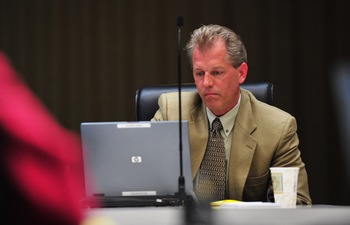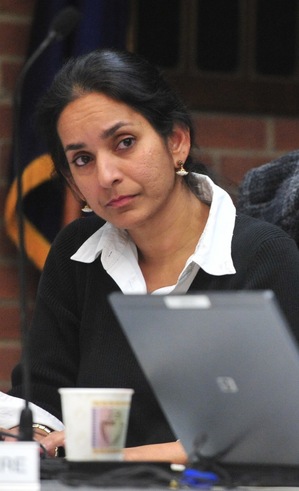Discussion on major ordinance changes to the Ann Arbor Downtown Development Authority have been postponed until the Ann Arbor City Council’s first meeting in September to allow time for revisions.
The council unanimously voted to push the item back on its agenda Monday night as it grappled with an otherwise heavy agenda, including the site plan for a controversial 413 E. Huron St. high-rise.
Clik here to view.

Stephen Kunselman
Ryan J. Stanton | AnnArbor.com file photo
The ordinance changes would diminish the DDA's revenue by about $1 million in tax revenues in the first year of implementation. Monday night, Kunselman stated at the beginning of the meeting he was pursuing a change to the recipient of the reimbursement from the leftover funds after the cut to the DDA’s tax revenue to include public housing trust funds.
Council Member Marcia Higgins, D-4th Ward, initiated the move of the issue to the later meeting date.
“I really appreciated Council Member Kunselman’s comments at our opening, April 15 meeting, talking about looking to work collaboratively,” Higgins said. “I think we need some time to look at this. I think he has taken some time to look at different funding models, and I think those motions are starting.”
Higgins said she anticipates the ordinance changes to include major changes from what council members were considering now.
Kunselman said he’s been seeking a postponement of the issue since the council’s last meeting.
“I agree there’s a lot on the table that needs to be discussed. We need to certainly bring the staff from the city and the DDA together,” he said, noting: “Clearly, there is something broken, otherwise we wouldn’t be where we are today having significant discussion about TIF rebate, about what the library is needing and the other taxing authorities.”
Higgins said she would like to see Kunselman and Kailasapathy work with staff and DDA board members to make the ordinance revisions clear and well-planned, which Kunselman said he was interested in doing.
Mayor John Hieftje has previously accused Kunselman of being politically motivated to attack the DDA.
“We can get to a better place, we can make (the DDA) stronger, we can make it worthy of our community so they can continue to do the good work that they do downtown,” Kunselman said Monday. “It’s always been my objective, not to hamstring or cut them so they can’t perform the great duties that the DDA does.”
Kailasapathy called for the council to exercise a degree of sincerity in the process.
Clik here to view.

Sumi Kailasapathy
Ryan J. Stanton | AnnArbor.com file photo
Council Member Margie Teall, D-4th Ward, said she wasn’t particularly interested in delving in to changes to the DDA but supported the postponing the issue in the spirit of collaboration with her councilmembers.
“I don’t think it’s broken,” Teall said. “ I think the DDA has done a great deal to almost bend over backwards to partnership with us.”
Teall said she believed some clarifications do need to be made in the DDA ordinance language, but that they could be handled by staff before September.
As an arm of the city government, the DDA works to improve the downtown area and manages the city's parking system.
The DDA is partly funded by a tax increment finance district that sees revenue from the increase in taxable value due to new development and construction within set boundaries.
Higher-than-anticipated revenues recently for the DDA as a result of burgeoning development downtown Ann Arbor caught the attention of Kunselman and prompted him to pursue the ordinance changes.
City records show that most of the DDA's increased revenue from the TIF district comes from recent downtown high-rise developments: Landmark, Zaragon West and The Varsity.
Kunselman’s and Kailasapathy’s ordinance changes as first introduced would force the DDA to refund about $931,000 to other taxing jurisdictions in the first fiscal year of implementation, including $559,000 to the city, $196,000 to Washtenaw County, $124,000 to Washtenaw Community College and $52,000 to the Ann Arbor District Library.
Monday night, Kunselman said he was pursuing a reimbursement to the Ann Arbor Housing Fund with the cut in the TIF revenue.
DDA board members must be appointed by the mayor and earn the approval of city council. They serve four-year terms, but there is no term limit.
The ordinance changes would implement a two-term limit.
The council voted 7-3 to give initial approval to those changes April 1, when Hieftje claimed the changes would mean $231,000 less for the city's general fund.
Hieftje attempted to strike the term limits from the ordinance changes in the April 15 meeting, but failed to gain the votes that he needed because several members had left due to the late hour of the meeting.
That eight-hour-long April 15 meeting saw many participants in the public hearing on the ordinance changes to the DDA.
The hearing had to be paused at the meeting and was continued Monday night, when about 13 people spoke before the council during the public hearing on DDA ordinance changes, many of whom were DDA board members.
Leah Gunn, DDA board member and Ann Arbor resident, said that the ordinance changes as proposed would destroy the DDA’s TIF.
Revenues from the TIF allow the DDA to support affordable housing initiatives in the city, including a recent $500,000 gift to the Ann Arbor Housing Commission, Gunn said.
“It this ordinance passes We will not be able to allocate the money that affordable housing deserves,” Gunn said.
Ali Ramwali, owner of downtown restaurant Jersulaem Garden, also spoke during the public hearing.
Construction of the DDA’s new underground parking structure was next door to Ramwali’s restaurant last year -- which caused the restaurant some grief.
“It was a nightmare; a fiasco,” Ramwali said. “I’m thankful the project’s over.”
The DDA was formed in the early 1980s to help towns revitalize their downtown districts after urban sprawl and shopping malls changed the business scene. Ramwali said Monday night that he believes the purpose of the DDA is ripe for reform.
“I’m here to see some reform gets made within the DDA to be changed to reflect that it’s 2013, not 1982,” he said. “Those realities need to be incorporated into the policies that city council takes forth.”
Ramwali suggested adding elected officials to the DDA’s board to add accountability to the body.
“Why don’t citizens have input on a body that has a $20 million budget?” he said. “We’re talking about taxation without representation.”
DDA board member Joan Lowenstein said to council members that the DDA is the only real economic development arm to the city council that has the ability to spend money on projects.
To approve the ordinance changes to the DDA would be to maintain the “toxic sludge of the status quo,” Lowenstein said.
Several other DDA board members who spoke Monday night, including Newcombe Clark, Sandi Smith and Russ Collins, called for the council members who had introduced the ordinances to meet directly with the DDA.
“If it’s about affordable housing, let’s sit down and talk about it,” Smith said to the council members. “It seems that we’re doing this for the wrong reasons at the wrong time.”
Collins said the DDA has historically been flexible to re-negotiate its contract for parking reimbursement with the city each time the city has asked.
“We are your partners; we want to talk to you,” Collins said. “This resolution doesn’t encourage that, I’m sorry to say.”
Amy Biolchini covers Washtenaw County, health and environmental issues for AnnArbor.com. Reach her at (734) 623-2552, amybiolchini@annarbor.com or on Twitter.